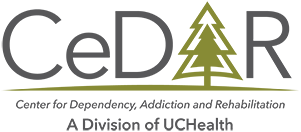Everybody experiences worry and fear from time to time. These emotions are a normal and expected reaction to uncertainty and doubt. However, when anxiety begins to affect a person’s ability to function in their day-to-day life, it becomes an anxiety disorder. Anxiety disorder affects millions of Americans and is the most common mental health condition in the United States. Unfortunately, only a fraction of these millions will receive professional help for anxiety, and a significant number are likely to self-medicate with drugs or alcohol. Someone with both a substance use disorder and an anxiety disorder is best treated with dual diagnosis treatment, which can address both conditions simultaneously.
When someone you love is struggling with anxiety, it can be difficult to know how to support them. It can be even more difficult to watch as they succumb to drug and alcohol use as they try to escape the pain of their mental health condition. CeDAR is a dual diagnosis treatment center with comprehensive programs to help those battling both substance use and anxiety. We offer a comfortable, safe environment where patients who suffer from co-occurring disorders can begin to heal. Our professional staff members are well-versed in evidence-based treatments and therapies to address the root causes of both conditions. If someone you care about needs help, call us today at 720.848.3000.
What Is a Dual Diagnosis?
A patient with a dual diagnosis is experiencing both a mental health disorder and a substance use disorder. The mental health disorder may have caused the substance use, or the patient may have developed the mental health disorder after long-term substance use. A patient can have a one-to-one correlation between their substance use disorder and mental health disorder, or they may experience multiple mental health issues. The treatment for all of these conditions is still called dual diagnosis treatment.
Mental health and physical health are closely interrelated. Those suffering from co-occurring substance use disorder and mental health concerns cannot heal from one and not the other. Both conditions need to be treated simultaneously, or recovery is likely only to be short-term. Anxiety is a common component of a dual diagnosis, but other mental health conditions may also be diagnosed, such as:
- Post-traumatic stress disorder or PTSD
- Depression
- Bipolar disorder
- Schizophrenia
- Insomnia
How to Help Someone With Anxiety
There are many ways to help someone deal with their anxiety:
- Give validation – Because every person is different, everyone will have different things that make them anxious. Recognize that their experience is valid and difficult for them, even if your experience is different.
- Express your concern – While there may not be much you can do at the moment when your loved one is experiencing anxiety, approaching them with your concerns can start a helpful dialogue once they are ready to process their anxiety. This can be an inroad towards the following way to help.
- Encourage them to get treatment – Once you can speak candidly to your loved one about their struggle with anxiety, you can better gauge whether their anxiety impedes their ability to enjoy life to the fullest. If necessary, you can encourage them to speak to someone about professional help.
Get Help for Anxiety at CeDAR
At CeDAR, we understand that getting treatment for mental health conditions and co-occurring substance use disorders may seem daunting. Many people with these conditions are reluctant to admit that they are in serious need of help. That’s why all our team members treat each patient with the utmost compassion and support so that they can focus on their healing and recovery. Starting a mental health and addiction treatment program is often the first step toward living a happier life. If someone you care about is ready to begin their recovery, contact us at 720.848.3000, and we can walk you through our admissions process.
